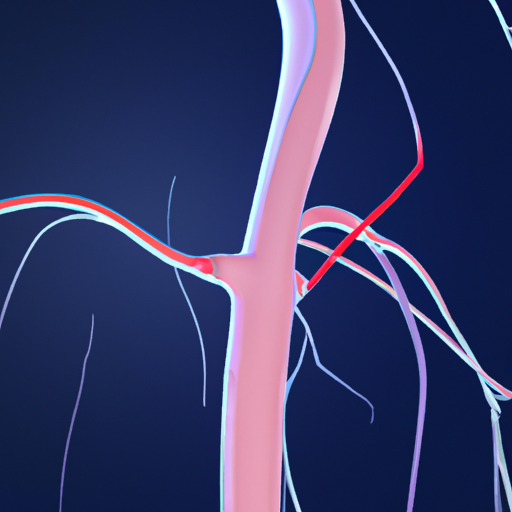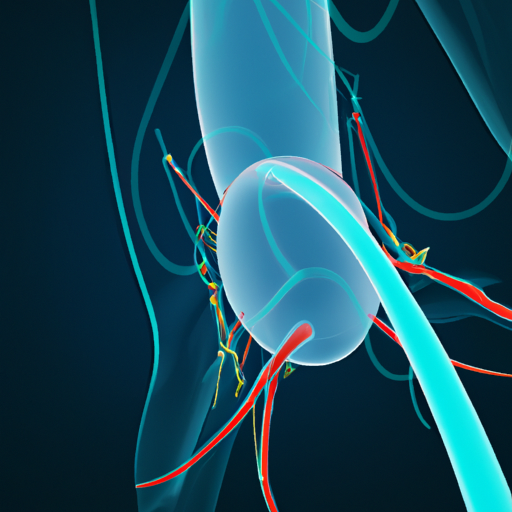Collagen, the most abundant protein in our bodies, plays a crucial role in maintaining the health and functionality of various organs and tissues.
In recent years, researchers have turned their attention to the potential benefits of collagen for lymph node health. Lymph nodes are critical components of our immune system, responsible for filtering out toxins and pathogens.
By supporting lymph node health, collagen may enhance our body’s immune response, leading to improved overall well-being. In this article, we will explore the fascinating link between collagen and lymph node health, shedding light on the potential advantages of incorporating collagen-rich foods and supplements into our daily routine.
Click Here if You Prefer to Listen to Quick Summary Content of the Blog Post about The Collagen Lymph Node
The Importance of Lymph Node Health
Lymph nodes play a crucial role in maintaining a healthy immune system. These small, bean-shaped glands are part of the lymphatic system and are found throughout the body.
While they may often go unnoticed, the lymph nodes are responsible for filtering and trapping harmful substances, such as bacteria, viruses, and abnormal cells, that could potentially cause infections or diseases.
In addition to their role in immune function, lymph nodes also aid in the circulation of lymph, a fluid that carries waste materials away from tissues and back into the bloodstream. Therefore, maintaining the health of lymph nodes is essential for overall well-being.
What are Lymph Nodes?
Lymph nodes are small, round or oval-shaped structures located along the lymphatic vessels. They are composed of specialized cells, including lymphocytes, macrophages, and dendritic cells, which are responsible for filtering and destroying pathogens or foreign substances.
Lymph nodes are connected via a network of lymphatic vessels, which allow the flow of lymph fluid throughout the body. These nodes are strategically positioned in areas where the concentration of pathogens is highest, such as the neck, armpits, groin, and abdomen.
The Role of Lymph Nodes in the Immune System
The immune system serves as the body’s defense mechanism against harmful invaders. Lymph nodes play a vital role in this system by helping to recognize and eliminate foreign substances. When harmful pathogens or toxins enter the body, the lymphatic system detects them and transports them to nearby lymph nodes.
Within these nodes, immune cells are activated to produce an immune response. This response can include the production of antibodies, the destruction of pathogens, and the recruitment of more immune cells to fight off the infection. Lymph nodes also help in the generation of memory cells, which provide long-term immunity against specific pathogens.
Understanding Collagen
What is Collagen?
Collagen is the most abundant protein in the human body, making up a significant portion of our connective tissues, such as skin, bones, tendons, and ligaments. It provides structural support, strength, and elasticity to various tissues, ensuring their proper function. Collagen is made up of amino acids, primarily glycine, proline, and hydroxyproline, which are essential for its synthesis.
Types of Collagen
There are different types of collagen in the body, each serving a specific function. Type I collagen is the most abundant and is found in the skin, bones, tendons, and organs. Type II collagen is present in cartilage, providing it with flexibility and cushioning. Type III collagen is found in blood vessels, muscles, and other organs, contributing to the overall integrity and strength of these tissues. Other types of collagen, such as types IV and V, are present in the basement membranes of cells, supporting their structure and function.
Sources of Collagen
Collagen can be obtained from both animal and plant sources. Animal sources include the skin, bones, tendons, and cartilage of animals such as cows, pigs, and chickens. These sources are commonly used in the production of gelatin or collagen peptides, which are broken down forms of collagen that can be easily absorbed by the body. Plant sources of collagen, on the other hand, are derived from fruits and vegetables that contain certain nutrients necessary for collagen synthesis, such as vitamin C and copper.
Collagen and Lymph Node Health
The Link Between Collagen and Lymph Nodes
Collagen plays a crucial role in maintaining the health and function of lymph nodes. The extracellular matrix (ECM) of lymph nodes, which is primarily composed of collagen fibers, provides structural support and helps regulate the proper functioning of immune cells within the nodes. Collagen fibers in the ECM also facilitate the flow and filtration of lymph fluid, allowing for efficient removal of toxins and waste products.
Improving Lymphatic Circulation
Healthy collagen levels in lymph nodes are essential for maintaining proper lymphatic circulation. The presence of intact collagen fibers in the ECM facilitates the movement of lymph fluid through the nodes, ensuring efficient filtration and transportation of waste materials. Collagen also helps maintain the integrity of lymphatic vessels, preventing their leakage and enhancing lymphatic flow.
Enhancing Immune Response
Collagen directly influences the immune response by providing a supportive environment within lymph nodes. The presence of collagen fibers in the ECM helps anchor immune cells, such as lymphocytes and macrophages, allowing them to interact efficiently with each other and with pathogens. This interaction is crucial for the activation and coordination of immune responses against infections or diseases.
Promoting Lymph Node Detoxification
Lymph nodes play a vital role in detoxification by filtering and removing toxins and waste materials from the lymph fluid. Collagen within the ECM acts as a molecular sieve, trapping and sequestering various harmful substances that could potentially cause harm to the body. By maintaining healthy collagen levels, lymph nodes can effectively carry out their detoxification function.

Benefits of Collagen for Lymph Node Health
1. Boosts Lymphatic Drainage
By supporting the structural integrity of lymph nodes, collagen helps improve lymphatic drainage. This allows for the efficient removal of toxins and waste materials from the body, reducing the risk of inflammation and promoting overall lymph node health.
2. Strengthens the Extracellular Matrix of Lymph Nodes
Collagen is a vital component of the extracellular matrix in lymph nodes, providing the necessary structural scaffolding for immune cells. Strengthening the ECM with collagen ensures proper cell signaling, immune cell migration, and overall lymph node function.
3. Supports Lymphocyte Function
Lymphocytes, a type of white blood cell, are key players in the immune system. Collagen helps create an environment within lymph nodes that supports lymphocyte function, including activation, proliferation, and response to infections or diseases.
4. Enhances Collagen Synthesis in Lymph Nodes
Collagen supplementation can help enhance collagen synthesis within lymph nodes. By providing the necessary building blocks, such as amino acids, collagen supplements can support the production and maintenance of collagen fibers in the ECM, leading to improved lymph node health.
5. Improves Detoxification of Lymph Node Tissue
Collagen’s molecular sieve-like properties aid in the detoxification process. By trapping and sequestering harmful substances, collagen helps prevent their circulation within the body and allows lymph nodes to effectively eliminate these toxins, promoting optimal lymph node health.
Methods to Increase Collagen Levels
Dietary Sources of Collagen
Consuming collagen-rich foods can help increase collagen levels in the body. Animal sources, such as bone broth, fish, and chicken skin, are especially rich in collagen. Plant-based foods, including fruits and vegetables, can also support collagen synthesis by providing essential nutrients like vitamin C and copper.

Supplements for Collagen Support
Collagen supplements, such as collagen peptides or gelatin, can be taken to support collagen production in the body. These supplements are typically derived from animal sources and are available in various forms, including powders, capsules, and liquids. It is important to choose high-quality supplements from reputable sources to ensure their efficacy and safety.
Lifestyle Choices to Promote Collagen Production
Certain lifestyle choices can positively influence collagen production in the body. Regular exercise, particularly strength training and resistance exercises, stimulates the synthesis of collagen in connective tissues. A balanced and nutrient-rich diet, along with adequate hydration, also supports collagen production. Additionally, avoiding or reducing habits that can harm collagen, such as smoking and excessive sun exposure, can help promote collagen health.
Other Factors Affecting Lymph Node Health
Hydration
Maintaining proper hydration is important for lymph node health. Drinking an adequate amount of water helps ensure the proper flow and movement of lymph fluid, optimizing lymphatic circulation and enhancing lymph node function.
Exercise
Regular physical activity, including aerobic exercises and strength training, plays a significant role in lymph node health. Exercise stimulates lymphatic circulation, improving the flow of lymph fluid and enhancing the overall function of the lymphatic system, including lymph nodes.
Stress Management
Chronic stress can negatively impact lymph node health by impairing immune function and lymphatic circulation. Practicing stress management techniques, such as meditation, deep breathing exercises, and mindfulness, can help reduce stress levels and support optimal lymph node function.
Precautions and Considerations
Consulting a Healthcare Provider
Before starting any new supplementation regimen, it is important to consult with a healthcare provider. They can determine whether collagen or any other supplement is suitable for your individual needs, taking into account your medical history and any potential interactions with medications or pre-existing conditions.
Possible Side Effects or Allergic Reactions
While collagen is generally considered safe for most individuals, it is possible for some people to experience side effects or allergic reactions. These can include digestive issues, skin rashes, or allergic responses to collagen supplements. If you experience any adverse reactions, it is recommended to discontinue use and seek medical advice.
Collagen Quality and Purity
When choosing collagen supplements, it is essential to select products that are of high quality and undergo rigorous testing for purity and potency. Ensure that the collagen is sourced from reputable manufacturers and that it meets industry standards for quality and safety.

Conclusion
Maintaining the health of lymph nodes is crucial for a well-functioning immune system and overall well-being. Collagen plays a significant role in supporting lymph node health by strengthening the extracellular matrix, improving lymphatic circulation, enhancing immune responses, and promoting detoxification.
By incorporating collagen-rich foods, supplements, and adopting lifestyle choices that support collagen production, you can optimize your lymph node health and promote a robust immune system.
Remember to consult with a healthcare provider and choose high-quality collagen products to ensure their effectiveness and safety.

